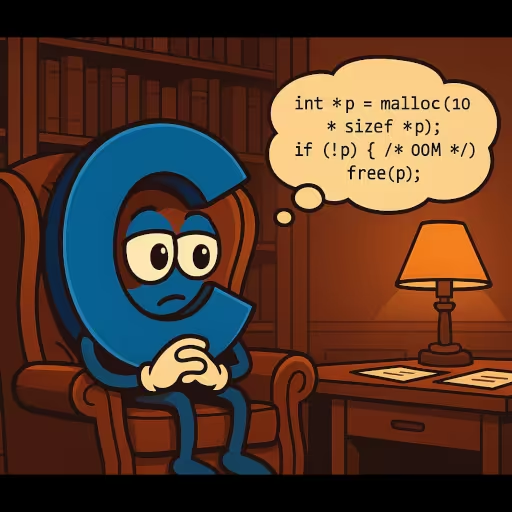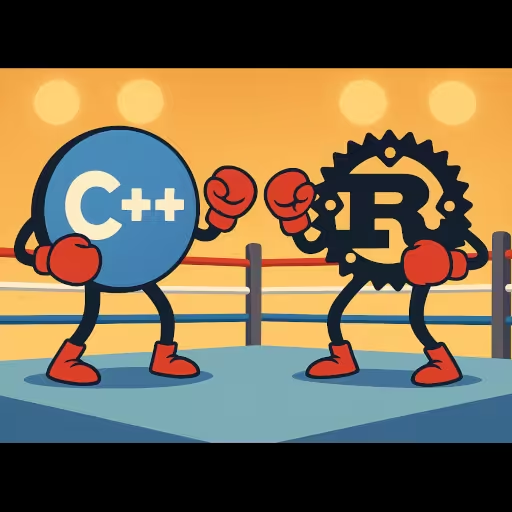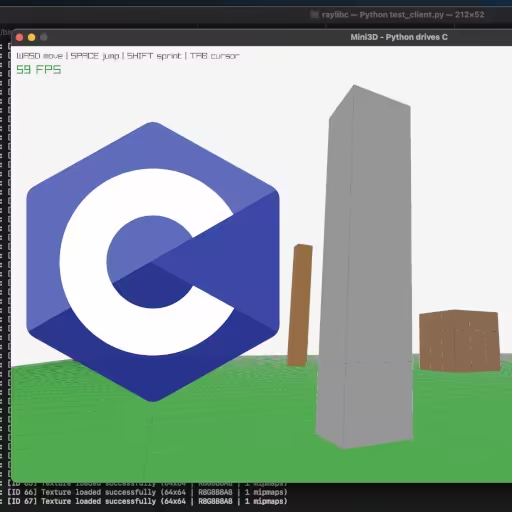C Dynamic Memory Allocation: Stack, Heap, and Best Practices
Memory management is a critical aspect of programming in C, as it directly impacts the performance and reliability of applications. Unlike higher-level languages that often handle memory allocation and deallocation automatically, C provides developers with the tools to manage memory manually. This gives programmers fine-grained control over how memory is allocated, used, and freed, but it also places the responsibility of avoiding memory leaks and segmentation faults squarely on their shoulders.
In C, memory can be allocated in two primary ways: statically and dynamically. Static memory allocation occurs at compile time, where the size of the memory required is known beforehand. This is typically done using global or local variables. On the other hand, dynamic memory allocation allows for more flexibility, enabling developers to request memory at runtime using functions like malloc(), calloc(), realloc(), and free(). This dynamic approach is particularly useful for applications that require variable-sized data structures, such as linked lists or dynamic arrays.
However, with great power comes great responsibility. Manual memory management in C can lead to several common pitfalls, including memory leaks, where allocated memory is not properly freed, and dangling pointers, which occur when a pointer references memory that has already been deallocated. To mitigate these issues, developers must adopt best practices, such as consistently pairing every allocation with a corresponding deallocation and using tools like Valgrind to detect memory-related errors.
Check out our Rust article about the borrow checker if you’re interested in the topic of memory management.
C vs. C++ Risk: Stroustrup’s Famous “Blowing Off Your Whole Leg” Quote
“C makes it easy to shoot yourself in the foot; C++ makes it harder, but when you do it blows your whole leg off” -Bjarne Stroustrup
Stroustrup, the creator of C++, said something to that effect back in the 80s.
The quote compares C and C++ in terms of risk and complexity with the essence of the quote claiming that programming in C can lead to relatively minor mistakes—like “shooting yourself in the foot”—whereas programming in C++ can result in much more severe errors, akin to “blowing off your whole leg.” This metaphor highlights the differences in error potential and complexity between the two languages.
Understanding the Metaphor
In C, developers have a straightforward approach to memory management and control structures, which can lead to manageable errors if not handled properly. For instance, a simple mistake like forgetting to free allocated memory might lead to a memory leak, but it typically won’t crash the entire program or cause catastrophic failures.
In contrast, C++ introduces additional layers of complexity with features like object-oriented programming, templates, and multiple inheritance. While these features provide powerful tools for abstraction and code reuse, they also increase the likelihood of more severe errors. For example, misuse of pointers, improper handling of object lifetimes, or complex template instantiations can lead to significant issues that are harder to debug and resolve.
🧠 What “Memory Allocation” Means
When your C program runs, it needs space in the computer’s memory (RAM) to store:
- Numbers, text, arrays, objects, etc.
- Temporary variables while functions run.
- Larger data structures (like game maps or textures) that live for more than one function call.
In C, unlike in JavaScript or Python, you decide where and how memory is created, used, and destroyed. That control is powerful but also dangerous if mismanaged.
What is Dynamic Memory Allocation in C?
In practical terms, dynamic memory allocation means you ask the computer for memory while the program is running, not beforehand.
Imagine you’re throwing a party:
- If you know exactly 10 guests are coming, you can set the table before anyone arrives. That’s like static allocation — fixed and predictable.
- If you don’t know how many will show up until the doorbell rings, you wait and add chairs as needed. That’s dynamic allocation — flexible, decided at runtime.
So in a program:
- With dynamic allocation, you say “give me enough space for N items”, where N might depend on user input, a file you just loaded, or how a network request turned out.
- The program gets a pointer or handle to that block of memory and uses it until it’s explicitly released (or garbage-collected in some languages).
Examples (in broad strokes):
- Dynamic: Allocating space for a user’s uploaded photo, because you don’t know its size in advance.
- Static: A fixed-size buffer for a 16-character password field baked right into the code.
Static Memory Allocation
Yes, there is such a thing — it’s the opposite of dynamic. With static allocation, memory is carved out at compile time (before the program even runs).
- It’s reserved once, and it never changes size.
- Examples: global variables, constants, or fixed-size arrays inside functions.
Benefits:
- Very fast, no surprises.
- No risk of forgetting to free memory. Downsides:
- Inflexible — you can’t adapt to larger inputs or variable workloads.
Why It Matters in Practice
- Static allocation is safe and efficient but rigid.
- Dynamic allocation gives you flexibility (resize arrays, load big data), but puts responsibility on you (to manage lifetime, avoid leaks, etc.).
That’s why modern languages build garbage collectors or smart pointers: they give you the flexibility of dynamic memory with less manual cleanup.
👉 TL;DR:
- Static allocation = memory size decided before the program runs (compile time).
- Dynamic allocation = memory size decided while the program is running (runtime).
- You need both: static for predictable, fixed resources; dynamic for unpredictable or user-driven workloads.
📌 The Three Main “Zones” of Memory in C
-
Stack
- Automatic, short-term storage.
- When you call a function, its local variables live here.
- Freed automatically when the function ends.
- Fast, but limited in size (usually a few MB).
- ⚠️ You can’t return a pointer to stack memory—it disappears when the function ends.
void foo() { int x = 42; // stored on the stack } // x is gone now
-
Heap
- Manual, long-term storage.
- You ask for it explicitly using
malloc,calloc, orrealloc. - You must release it yourself with
free(). - Flexible and large, but slower and error-prone.
- ⚠️ If you forget to
free, you “leak” memory. If you free twice, you risk a crash.
int *arr = malloc(10 * sizeof(int)); // heap // ...use arr... free(arr); // must be freed manually
-
Globals / Statics
- Memory reserved for the entire life of the program.
- Used for constants or data that’s always needed.
- You don’t allocate or free these—they just exist.
int global = 99; // lives forever static int count; // also persists until program exit
Heap vs Stack in C
When you write C code, most of the memory you touch comes from one of two places: the stack or the heap. Both are just regions of your computer’s RAM, but they’re managed in very different ways, and understanding the distinction is critical to writing safe, efficient programs.
The Stack: Fast, Temporary Storage
The stack is like a neat pile of plates in a cafeteria. Every time you call a function, C “pushes” the function’s local variables onto the stack. When the function returns, those variables are “popped” off automatically. You never have to free them, and the stack keeps things organized for you.
- Pros: Very fast, automatically managed, perfect for small, short-lived variables.
- Cons: Limited size (a few MB by default). You can’t keep stack memory after the function ends, and you definitely can’t return a pointer to it.
Example:
void foo() {
int x = 42; // lives on the stack
} // x disappears hereThe Heap: Flexible, Manual Storage
The heap is more like a hotel. You can rent rooms (malloc/calloc/realloc) and release them when you’re done (free). Unlike the stack, heap memory stays around until you explicitly let it go. That makes it perfect for big data structures, dynamic arrays, or anything that outlives a single function call.
- Pros: Large and flexible, can allocate memory at runtime.
- Cons: Slower than stack, you must manually manage it, and mistakes (forgetting to free, freeing twice, or using freed memory) cause leaks and crashes.
Example:
int *arr = malloc(10 * sizeof(int)); // lives on the heap
// ...use arr...
free(arr); // manual cleanup✅ TL;DR: Stack and Heap Memory in C
- Use the stack for short-lived, small variables where lifetime ends with the function.
- Use the heap for data that needs to survive across functions or scale in size dynamically.
- Globals and statics are the third category—they live as long as the program does, but should be used sparingly.
👉 If you think of your program as a kitchen:
- Stack = your cutting board (fast, temporary workspace).
- Heap = the refrigerator (slower to access, but things last as long as you need).
- Globals = the stove bolted to the floor (always there, until the kitchen closes).
The “stack” is LIFO (Last In, First Out) where the most recent data is removed from memory—it’s short-lived and automatic. The heap is manual, but is long-lived, and globals last “forever” (or as long as the program runs).
And the big one: 👉 The function or code that allocates it is the one that is responsible for also freeing it.
🎯 Common Beginner Pitfalls
- Returning stack memory → invalid pointer.
- Forgetting to free heap memory → leak.
- Freeing too early → dangling pointer.
- Freeing twice → crash.
- Mixing allocators (e.g. freeing memory from another library) → undefined behavior.
🔧 Why C Makes You Manage Memory
- C was designed to be close to the hardware, so it doesn’t hide memory management like JS, Python, or Go (which all use garbage collectors).
- The upside: You get predictable performance and control.
- The downside: You’re the garbage collector now.
🪑 Analogy: The Hotel
Think of memory as a hotel with three types of rooms:
-
Stack = a tray on your desk. You put stuff on it while working. When you leave the desk (function ends), the tray is cleared. You don’t worry about cleanup.
-
Heap = renting a hotel room. You go to the front desk (
malloc) and book a room. You’re responsible for checking out (free). If you forget, the room stays occupied (memory leak). If you try to check out twice, chaos ensues (double free). -
Globals = permanent furniture in the hotel. The couch in the lobby is always there, until the hotel closes (program ends). You don’t get rid of it.
✅ Beginner TL;DR
In C, you manage memory yourself. Use stack for quick, short-lived things, heap for dynamic or large things you control, and globals for always-there values. The heap is powerful but dangerous—treat it like hotel rooms: rent them when needed, check out when done, and never hand someone else’s key back to the front desk.
C Dynamic Memory Allocation
Here’s a tight, practical rundown on C dynamic memory allocation—what matters, what bites, and how to structure your code so it doesn’t rot.
1) The Core APIs
void* malloc(size_t size): uninitialized bytes. ReturnsNULLon failure.void* calloc(size_t n, size_t size): zero-initializedn * sizebytes. Often faster thanmalloc+memsetdue to OS zero-pages.void* realloc(void* p, size_t new_size): resize block; may move it. On failure returnsNULLand leavespvalid.void free(void* p): safe to call withNULL(no-op).
Rules
- Always include
<stdlib.h>; don’t castmallocin C. - Use
sizeof *ptr, notsizeof(type)to avoid mismatch errors. - Treat allocation failure as a real possibility.
T *p = malloc(count * sizeof *p);
if (!p) { /* handle OOM */ }2) Overflow & Size Math (most missed bug)
When computing n * size, check for overflow:
#include <limits.h>
#include <stdbool.h>
static bool mul_overflow_size(size_t a, size_t b, size_t *out) {
if (a && b > SIZE_MAX / a) return false;
*out = a * b; return true;
}Use with malloc/calloc if you ever do manual multiplication (e.g., for realloc).
3) realloc—the sharp edges
- On success: old pointer becomes invalid (it may have moved).
- On failure: returns
NULL, and the old pointer is still valid. - Correct pattern:
void *tmp = realloc(p, new_size);
if (!tmp) { /* OOM: p is unchanged */ }
else p = tmp;realloc(NULL, n)≡malloc(n).realloc(p, 0)either frees and returnsNULLor returns a unique pointer you can’t use—treat it as free: prefer explicitfree(p); p = NULL;.
4) Ownership & Lifetime (decide once, stick to it)
- Single owner per allocation. The allocating layer frees it.
- Express ownership in names:
*_create/*_destroy,*_init/*_deinit,*_load/*_unload. - Never free memory you didn’t allocate. Never expect the caller to free memory you allocated unless the API contract says so.
5) Patterns that scale
a) Stretchy Vector
Minimal, cache-friendly dynamic array:
typedef struct {
size_t len, cap;
int *data;
} VecInt;
bool vec_reserve(VecInt *v, size_t want) {
if (want <= v->cap) return true;
size_t new_cap = v->cap ? v->cap * 2 : 8;
if (new_cap < want) new_cap = want;
int *tmp = realloc(v->data, new_cap * sizeof *tmp);
if (!tmp) return false;
v->data = tmp; v->cap = new_cap; return true;
}
bool vec_push(VecInt *v, int x) {
if (!vec_reserve(v, v->len + 1)) return false;
v->data[v->len++] = x;
return true;
}
void vec_free(VecInt *v) {
free(v->data); v->data = NULL; v->len = v->cap = 0;
}b) Arena/Region Allocator (great for “allocate a lot, free all at once”)
- Allocate big chunks; hand out linear sub-blocks.
arena_reset(arena)invalidates everything in one shot (good for per-frame/per-level memory).- Cuts fragmentation and frees bookkeeping overhead.
c) Pool/Slab for fixed-size objects
- Pre-allocate N nodes; maintain a free list.
- O(1) allocate/free; zero fragmentation. Perfect for entities, components, or chunk metadata.
6) Alignment
-
mallocis sufficiently aligned for any fundamental type. For SIMD/file I/O/GPUs you may need stricter alignment:- POSIX:
int posix_memalign(void **p, size_t align, size_t size); - C11:
void *aligned_alloc(size_t align, size_t size);(size must be multiple ofalign).
- POSIX:
-
Still
free()the result (same deallocator).
7) Initialization: zero vs explicit
callocsets all bits to zero. For pointers/integers/floats, that’s a valid zero value.- For non-trivial invariants, do explicit init after
malloc/calloc. Don’t assume zero means “valid”.
8) Error Handling (don’t hand-wave OOM)
Use a single cleanup exit to avoid leaks:
int do_work(...) {
int rc = -1;
Foo *a = NULL; Bar *b = NULL;
a = malloc(sizeof *a); if (!a) goto cleanup;
b = malloc(sizeof *b); if (!b) goto cleanup;
// ... work ...
rc = 0;
cleanup:
free(b);
free(a);
return rc;
}If your app treats OOM as fatal (many games do), wrap with “x-alloc” helpers that abort:
void *xmalloc(size_t n) {
void *p = malloc(n);
if (!p) { fprintf(stderr, "OOM %zu bytes\n", n); abort(); }
return p;
}9) Fragmentation & Performance
- Prefer fewer, larger allocations; batch where possible.
- Grow capacities geometrically (x1.5—2).
- Favor contiguous arrays over pointer graphs for cache locality.
- Avoid per-element
malloc; it destroys performance. - For multithreaded alloc/free hot paths, consider a modern allocator (
jemalloc/tcmalloc/mimalloc) or thread-local pools.
10) Debugging & Tooling
- AddressSanitizer/LeakSanitizer:
-fsanitize=address -fno-omit-frame-pointer -g - UndefinedBehaviorSanitizer:
-fsanitize=undefined - Valgrind (Linux/macOS Intel): excellent for leak finding and invalid accesses.
- CRT debug heap on Windows (
_CrtSetDbgFlag) for leak reports. - Sprinkle canaries/guards in debug builds if you roll your own allocators.
11) Common Footguns (checklist)
- ⛔ Returning pointers to stack memory.
- ⛔ Not checking
reallocwith a temp pointer. - ⛔ Integer overflow in
n * size. - ⛔ Freeing twice / freeing non-owned memory.
- ⛔ Using memory after
free(dangling); set pointers toNULL. - ⛔ Holding interior pointers into a buffer that later gets
realloc’d (they’ll dangle if the block moves). - ⛔ Mixing allocators across libraries (allocate in lib A, free in lib B).
Conclusion
In conclusion, memory management in C is a double-edged sword that offers both flexibility and complexity. While it allows developers to optimize resource usage and create efficient applications, it also demands a thorough understanding of memory allocation principles and careful coding practices. By mastering memory management techniques, C programmers can harness the full potential of the language, creating robust and high-performance software while minimizing the risks associated with manual memory handling.
Also, if you remember nothing else: stack is automatic, heap is manual, globals last forever — and whoever allocates must free.










